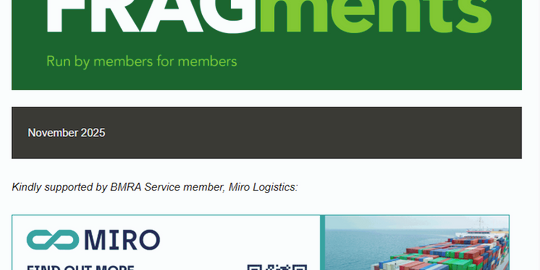Volumes show some signs of recovery
As many countries move into a new phase of their response to COVID-19, BIR presents the latest in its series of expert updates on the impact of the pandemic on recycling markets around the world. The following article is based on contributions from the world organization’s President, its Divisional Presidents and Committee Chairmen.
China, Hong Kong and Taiwan are slowly returning to normal; COVID-19 cases in China have been declining sharply over the past month while no new cases have been reported in Taiwan for two weeks. Customers have also begun purchasing normally, with non-ferrous metals volumes appearing to climb 20-30% compared to the previous week. The buying mood is being greatly impacted by the prospect of China’s reclassification of “recycled material” which is scheduled to come into effect for brass, copper and cast aluminium alloys on July 1.
In the global ferrous scrap sector too, businesses are slowly returning to work and demand is picking up; the main issue at present surrounds banking in India, with delays reported in getting Letters of Credit opened. From Greece, greater normality is emerging in the e-scrap sector as suppliers gradually re-start their businesses and improve the sourcing of raw materials. Exports - for example, to India - have begun to regain some of their previous impetus.
Within Europe’s plastics recycling industry, there remains a feeling of uncertainty. Prices are still low owing to the oil price slump and huge stocks are overhanging the market. However, there are some glimmers of hope: companies are being allowed to restart production with the cancelling of some lockdown restrictions, and demand is slowly increasing. Among those to restart is the car industry, a major consumer of recycled raw materials.
European plastics recyclers obviously have little idea themselves how supply - and thus the entire pricing structure - will develop in the coming weeks. In China, factories are resuming production and, as a positive sign, prices of polypropylene and styrenics have increased over the last two weeks.
Most export-orientated rubber clients in India resumed operations a couple of weeks ago and are now ordering as much as before the outbreak of COVID-19. On the supply side in Europe, there are emerging issues with securing enough material as several months with far fewer cars and trucks on the road have served to reduce the availability of end-of-life tyre materials.
The textiles recycling sector is still experiencing very low demand from many end markets and for all qualities, although some markets in Eastern Europe are now showing the first signs of improvement. Furthermore, some graders have restarted production or have announced that they will be doing so within the coming days, albeit at reduced volumes. Collections of used textiles in Western Europe remain below normal levels but are also increasing.
As regards paper recycling, 77% of plants in France are now open and 3% are opening on appointment. Out of 18,000 employees, 10.5% are operating from home, 25% are working part-time and 7% are not working.
Looking to the wider picture, collections in France are down by: 20% for paper and cardboard, 37% for industrial waste, 82% for construction waste, 24% for plastics, 48% for wood and 75% for metals. Total turnover was down year on year by 39% in March and by 64% in April.
Across in the UK, Prime Minister Boris Johnson announced some changes to lockdown measures on May 10. In effect, the rule about working from home where possible is retained unless the job requires a person to be at a place of work such as with construction and manufacturing; what jobs can or cannot be done from home has always been an area of confusion.
Social distancing must still be maintained and those going to work are being asked to avoid the use of public transport where possible, which is completely impractical for many people in cities. Some primary schools could reopen from June 1 but the vast majority of secondary schools will not return until September. Restaurants and cafés are to remain closed until at least July; the hospitality trade is suffering greatly and hopes were for some relaxation of restrictions or for at least some plan on phasing in reopening, but there has been no change.
Unessential shops, hairdressers and gyms, etc., also remain closed, with no new measures introduced. Unlimited outdoor exercise is now allowed and people can engage in sports, but only with members of the same household.
Much debate and confusion have been created by the government’s decision to introduce a two-week quarantine period for people arriving at UK airports, except for those coming from the Republic of Ireland and France. The move has been described by the airline and travel industries as the final nail in the coffin for many operators out of the UK. To be imposed shortly, the UK seems to be adopting this measure when many other countries are actually lifting such requirements as this was among the first measures that they introduced.
Meanwhile, the UK’s engineering and automotive sectors should begin their return over the coming days.


